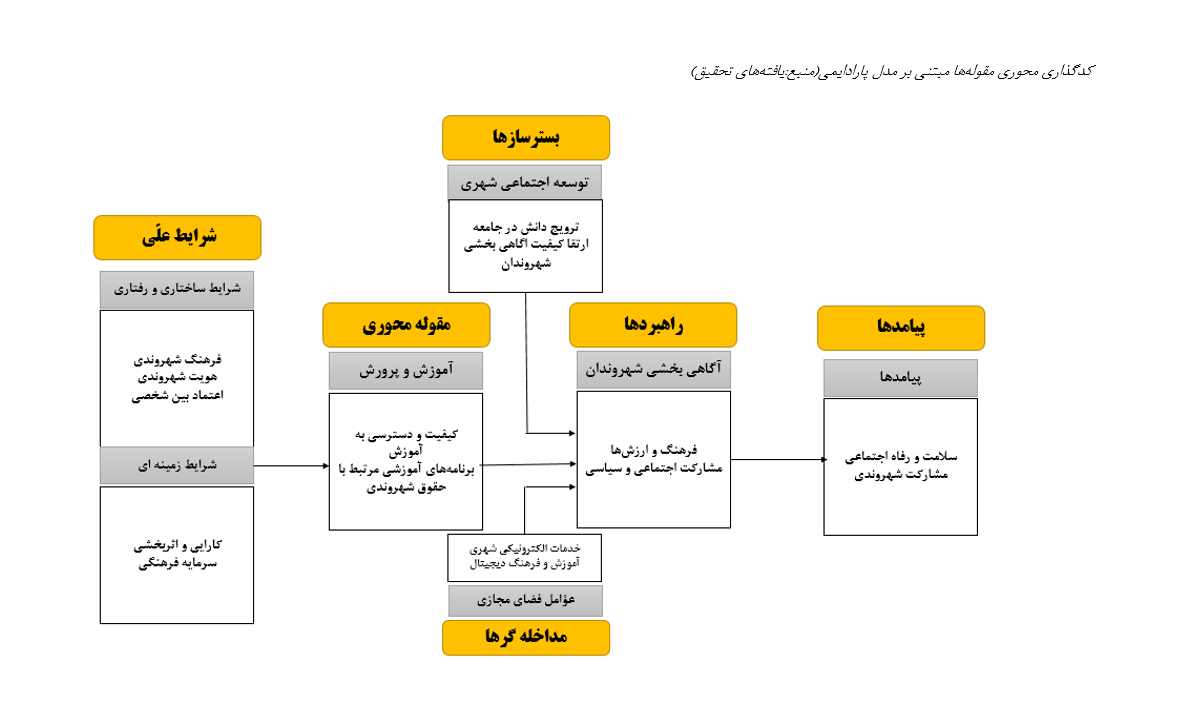الگوی شهروندی در توسعه فرهنگی و اجتماعی با تاکید بر کاربران فضای مجازی: رویکرد گراندد تئوری
کلمات کلیدی:
فرهنگ شهروندی, توسعه فرهنگی, توسعه اجتماعی, فضای مجازی, گراندد تئوریچکیده
هدف این پژوهش، الگوی شهروندی در توسعه ی فرهنگی و اجتماعی با تاکید بر کاربران فضای مجازی مبتنی بر رویکرد گراندد تئوری است. بر این مبنا، در ابتدا مبتنی بر روش نظریهپردازی دادهبنیاد، مقولههای شکلدهنده مدل با کدگذاری باز شناسایی و در ادامه با بهرهمندی از کدگذاری محوری و انتخابی، مدل مورد نظر ارائه شده است. جامعه آماری برای ارائه مدل، شامل خبرگان و صاحب نظران حوزه مدیریت، مدیران و معاونان حوزه آموزشهای شهروندی و توسعه اجتماعی و فرهنگی و کارکنان حوزه آموزشهای شهروندی و توسعه اجتماعی و فرهنگی بود. نمونه آماری خبرگان تا مرحله اشباع نظری به تعداد 9 نفر به روش گلوله برفی انتخاب شد. ابزار گردآوری دادهها، مطالعات کتابخانهای و مصاحبه نیمهساختاریافته با خبرگان بود. روایی سؤالات مصاحبه به روش محتوایی و پایایی آن با اجرای روش بازآزمون (897/0) تأئید گردید. مبتنی بر نظریهپردازی دادهبنیاد، شرایط علّی (شامل شرایط ساختاری،رفتاری و زمینه ای)، مقوله محوری (آموزش و پرورش)، بسترسازها (توسعه اجتماعی شهری)، عؤامل زمینهای (شامل فضای مجازی)، راهبردها (آگاهی بخشی شهروندان) و پیامدها (مشارکت شهروندی و بهبود کیفی و افزایش شفافیت) در مدل پارادایمی تبیین و در نهایت روابط بین آنان در مدل انتخابی مشخص شد. الگوی شهروندی در فضای مجازی میتواند با ترویج مسئولیتپذیری و آگاهی، به توسعه فرهنگی و اجتماعی کاربران کمک کند. این الگو باعث میشود افراد با احترام به حقوق دیگران و رعایت قوانین، محیطی امن و سازنده ایجاد کنند. همچنین، با تشویق به مشارکت فعال و تبادل نظر، به ارتقای دانش و فرهنگ جمعی کاربران میانجامد.
دانلودها
مراجع
Beaman, J. (2013). French in the eyes of others: cultural citizenship, marginalization, and France's middle-class North African second-generation. European University Institute, Max Weber Program.
Bokharaei, A., Shorbatiyan, M. H., & Kabiri, L. (2017). Sociological analysis of cultural citizenship status (Case study: citizens of Tonekabon). Applied Sociology, 14(5), 125-174.
Duffy, B. E., Poell, T., & Nieborg, D. B. (2019). Platform practices in the cultural industries: Creativity, labor, and citizenship. Social Media + Society, 5(4), 2056305119879672. https://doi.org/10.1177/2056305119879672
Faraji, T. (2018). The role of virtual spaces in civic education among Tehran citizens. First International Conference on Psychology, Educational Sciences, and Social Studies, Hamedan.
Fereydoun Nejad, M. (2024). The necessity of civic skills education to improve social development. Social Development Studies, 12(16), 157-188.
Ghaffari-Nasab, E., Qasemi-Najad, M. A., Mosaavat, S. I., & Habibi Farashbandi, S. M. (2019). A sociological analysis of the status of civic culture (Case study: citizens aged 15 and over in the city of Eqlid). Social and Cultural Changes, 16(2).
Hapsari, D., Riyanto, S., & Endri, E. (2021). The Role of Transformational Leadership in Building Organizational Citizenship: The Civil Servants of Indonesia. The Journal of Asian Finance, Economics and Business, 8(2), 595-604.
Karimi, H. (2011). Seminar on media and civic education. First Seminar on Media and Civic Education, Tehran Municipality Citizen Education Department.
Leccardi, C. (2016). Youth Cultures in the New Century: Cultural Citizenship and Cosmopolitanism. Brill. https://doi.org/10.1163/9789004324589_008
Moradhassel, N., & Amirhossein, M. (2015). Examining the effect of utilizing the capabilities of virtual space on achieving sustainable urban development in Iran (Provincial approach). Telecommunications Research Center, Tehran.
Muller, F., & Hermes, G. (2010). The Performance of Cultural Citizenship: Audiences and the Politics of Multicultural Television Drama. Critical Studies in Media Communication, 27, 193-208. https://doi.org/10.1080/15295030903550993
Naghdi, H., Taghipour, F., & Ebrahimzadeh Dashtjardi, R. (2024). Providing a model for enhancing civic culture based on the use of social networks among Tehran citizens. Social Development Studies, 12(6), 127-147.
Olssen, M. (2021). From the Crick Report to the Parekh Report: Multiculturalism, Cultural Difference and Democracy: The Re-Visioning of Citizenship Education. Brill. https://doi.org/10.1163/9789004464452_006
Sari, D. P., & Ali, H. (2022). Literature Review Measurement Model of Individual Behavior and Organizational Citizenship Behavior: Individual Characteristics, Work Culture and Workload. Dinasti International Journal of Management Science, 3(4), 647-656.
Shah-Talebi, B., Gholizadeh, A., & Sharifi, S. (2010). Development of components of civic culture in the realm of values and norms for middle school students. Quarterly Journal of Leadership and Educational Management, University of Azad, Garmsar Branch, 4(2), 73-96.
Street, J., Inthorn, S., & Scott, M. (2015). From Entertainment to Citizenship: Politics and Popular Culture. Manchester University Press. https://doi.org/10.7765/9781526102959.00006
Tran, T. B. H., & Choi, S. B. (2019). Effects of Inclusive Leadership on Organizational Citizenship Behavior: The Mediating Roles of Organizational Justice and Learning Culture. Journal of Pacific Rim Psychology, 13, e17. https://doi.org/10.1017/prp.2019.10
Zapata-Barrero, R. (2016). Diversity and Cultural Policy: Cultural Citizenship as a Tool for Inclusion. International Journal of Cultural Policy, 22(4), 534-552. https://doi.org/10.1080/10286632.2015.1015533

دانلود
چاپ شده
ارسال
بازنگری
پذیرش
شماره
نوع مقاله
مجوز
حق نشر 2025 Seyed Abdolreza Hosseini (Author); Nader Sadeghi Lavasani Nia (Corresponding Author); Ruhollah Ahmadzadeh Kermani (Author)

این پروژه تحت مجوز بین المللی Creative Commons Attribution-NonCommercial 4.0 می باشد.







